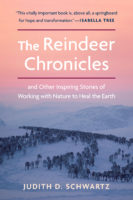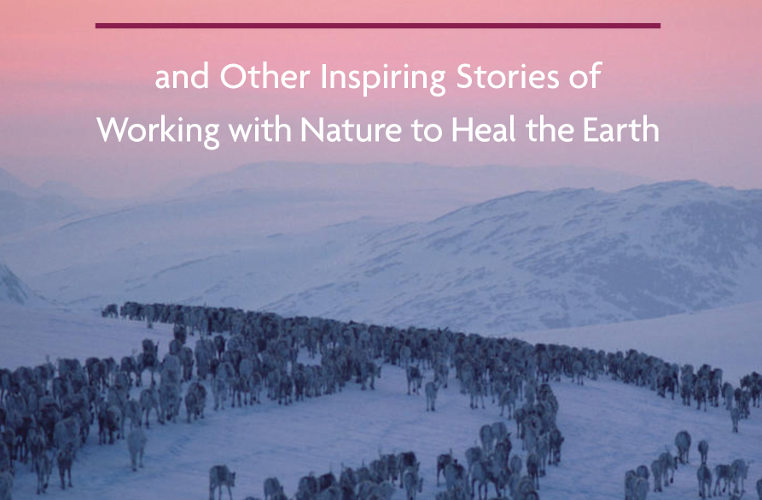 The following excerpt is adapted from Judith D. Schwartz’s book The Reindeer Chronicles: And Other Inspiring Stories of Working with the Land to Heal the Earth (Chelsea Green Publishing, August 2020) and is reprinted with permission from the publisher.
The following excerpt is adapted from Judith D. Schwartz’s book The Reindeer Chronicles: And Other Inspiring Stories of Working with the Land to Heal the Earth (Chelsea Green Publishing, August 2020) and is reprinted with permission from the publisher.
Ed.note: This excerpt is taken from the chapter Science and Inspiration, where the author is visiting several inspiring and restorative projects in the southeastern region of Spain, including Camp Altiplano, which you can find out more about here.
We regroup at the farmhouse kitchen to say goodbye. We’ve got that sketchy drive back to Vélez Blanco ahead of us, unlikely to get any easier once dusk falls. I join Jonathan at his computer to suggest reading sources, and we chat for a few moments. With the ecological and climate crises, “people are going through a kind of grief,” he says. “We’ve all gone through periods of huge depression for what’s going on.” He says that Camp Altiplano and efforts like it can provide hope, community, and a sense of meaning that may be absent in other realms, particularly those in which the reality of crisis is denied. And that taking action is an antidote to depression.
I recall something Yanniek had said just a few minutes before, that some of the young people who find their way to the Regeneration Academy are “close to giving up on the world” and that the curriculum offers “an example of what’s possible.” I think of the bright faces I’d walked past as Yanniek led us through the study space on our way back to the farmhouse, young people focused on their projects. For all the world they looked like contented scholars, engaged with their work and with ripe futures before them. I am reminded that when you’re in your twenties, your countenance doesn’t necessarily betray your pain. I was likely the same way.
I feel a new kind of grief, not for myself but for today’s youth, those sensitive to nature and who never had the chance to take forests, birds, and insects for granted the way I was able to. This entire cohort and those to follow are deprived of the incalculable solace of predictable seasons, the transition from, say, winter to spring so defined and familiar you know it in your bones. If I could change that, and somehow give them the blithe assurance of nature’s permanence that I’d enjoyed at their age, I would do it in a heartbeat.
I think of what I’ve learned from reporting my book, The Reindeer Chronicles. Not just about restoring ecosystems, but about the power in focusing on what’s possible rather than impediments; on best possible outcomes instead of what one dreads; on action rather than inertia. It occurs to me that the Ecosystem Restoration Camp movement is in many ways a manifestation of best possible outcome thinking.
Let’s go back to that pivotal consensus question: Given that the goal—in this case, to restore earth’s degraded ecosystems—is impossible, what would you do if it were achievable?
How might someone answer this? Maybe, to start, find land to restore and live there, or restore the land you’re living on. Build soil organic matter. Keep water in the ground. Grow some healthy food. Establish trees and other deep-rooted perennial plants. Bring animals onto the land. Gather with others who share your passion for healing the earth. Ditch the apathy. Jettison the cynicism. Make music and art. Dance. Create new things and refurbish old things in beautiful ways. Keep learning how to do things better and keep records of progress. Expect unforeseen challenges and find ways to laugh at them. Be resourceful and open to offers of help. Celebrate small victories. Spread the word.
This is what the folks at Camp Altiplano are doing. Accepting the inevitability of feared outcomes, which frequently takes the form of ironic distance, serves to absolve us of responsibility. These young people are taking responsibility. They are living in line with their best possible outcomes. In doing so they are ever-so-slightly tilting the universe in that direction. Who knows how powerful these actions will be, and who will be inspired by them.
“I feel like we’re in the anteroom before the stage curtain, that we’re at stage left,” Jonathan says. “This work is about to be thrust into the spotlight. At some point people will say, ‘We need our rivers.’”
And the global task of ecosystem restoration will begin in earnest. Once ideas on how to achieve what’s assumed to be impossible are articulated, that goal is no longer impossible.
Let’s get inspired.





